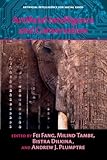Artificial intelligence and conservation
Material type: TextSeries: Artificial intelligence for social goodPublication details: Cambridge CUP 2019Description: x, 236p. illustrationsISBN: 9781108464734 Subject(s): Wildlife conservation | Artificial intelligenceDDC classification: 333.954 Summary: With the increasing public interest in artificial intelligence (AI), there is also increasing interest in learning about the benefits that AI can deliver to society. This book focuses on research advances in AI that benefit the conservation of wildlife, forests, coral reefs, rivers, and other natural resources. It presents how the joint efforts of researchers in computer science, ecology, economics, and psychology help address the goals of the United Nations' 2030 Agenda for Sustainable Development. Written at a level accessible to conservation professionals and AI researchers, the book offers both an overview of the field and an in-depth view of how AI is being used to understand patterns in wildlife poaching and enhance patrol efforts in response, covering research advances, field tests and real-world deployments. The book also features efforts in other major conservation directions, including protecting natural resources, ecosystem monitoring, and bio-invasion management through the use of game theory, machine learning, and optimization.
TextSeries: Artificial intelligence for social goodPublication details: Cambridge CUP 2019Description: x, 236p. illustrationsISBN: 9781108464734 Subject(s): Wildlife conservation | Artificial intelligenceDDC classification: 333.954 Summary: With the increasing public interest in artificial intelligence (AI), there is also increasing interest in learning about the benefits that AI can deliver to society. This book focuses on research advances in AI that benefit the conservation of wildlife, forests, coral reefs, rivers, and other natural resources. It presents how the joint efforts of researchers in computer science, ecology, economics, and psychology help address the goals of the United Nations' 2030 Agenda for Sustainable Development. Written at a level accessible to conservation professionals and AI researchers, the book offers both an overview of the field and an in-depth view of how AI is being used to understand patterns in wildlife poaching and enhance patrol efforts in response, covering research advances, field tests and real-world deployments. The book also features efforts in other major conservation directions, including protecting natural resources, ecosystem monitoring, and bio-invasion management through the use of game theory, machine learning, and optimization.
| Item type | Current library | Call number | Status | Date due | Barcode |
|---|---|---|---|---|---|
 BK
BK
|
Stack | 333.954 ART (Browse shelf (Opens below)) | Available | 51204 |
With the increasing public interest in artificial intelligence (AI), there is also increasing interest in learning about the benefits that AI can deliver to society. This book focuses on research advances in AI that benefit the conservation of wildlife, forests, coral reefs, rivers, and other natural resources. It presents how the joint efforts of researchers in computer science, ecology, economics, and psychology help address the goals of the United Nations' 2030 Agenda for Sustainable Development. Written at a level accessible to conservation professionals and AI researchers, the book offers both an overview of the field and an in-depth view of how AI is being used to understand patterns in wildlife poaching and enhance patrol efforts in response, covering research advances, field tests and real-world deployments. The book also features efforts in other major conservation directions, including protecting natural resources, ecosystem monitoring, and bio-invasion management through the use of game theory, machine learning, and optimization.


There are no comments on this title.